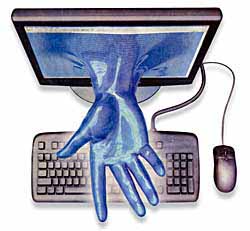Cyberspace Defined
Rules For Living In The New Multiverse
2005 09 02
By John Kaminski | JohnKaminski.com
 Why in the world would you pretend to be someone else when you could most easily be the lovely person that you already are? Why in the world would you pretend to be someone else when you could most easily be the lovely person that you already are?
In cyberspace, people pretend they are someone they are not all the time. A big part of the cybergame is figuring out what the difference is between who they say they are and who they actually are. Just like in real life.
It's not all malicious. Some of it is downright behavioral. People have to do what their early childhood education, their genes, and their astrological configuration demand they do, or they won't be happy. And people who pretend to be someone they're not are definitely not happy.
Or else they would simply be who they are.
Cyberspace is first and foremost a social skid greaser. It multiplies the opportunities exponentially for people to get together with other people with similar interests. I mean, you can Google anything and find hundreds of people - or, in my case, two or three - on the exact same wavelength you are. Hence, it's an excellent medium for commerce, which many millionaires have already found out.
Much of what I've seen in cyberspace these past three years is a very good sign for human civilization. The level of politeness and trust is much higher than it is in the real world, perhaps because, as with the telephone, there is no threat of physical attack, except for mad hackers tripping over their own egos and testing the patience of the rest of us, or those ubiquitous letters from Africa promising millions if we'll just give them our bank code.
Some over-vigilant opinion posits that the Internet is being squeezed by doctrinarians eager to warp and manipulate history, but this is a neverending process that began ten minutes after the first word was written, and continues today in the profession of spinmeister publishers.
Yet two things strike me as contravening that view. First is research parameters. Anyone can, with any subject, find more relevant information about a topic than one could possibly, in one lifetime, use. And second, antiestablishment views are nowhere more evident than in cyberspace, where in the first five years of the new millennium, a growing gaggle of newssites already has made the corporate media we have come to rely upon for our own sense of history totally irrelevant - mere polluted shills for products that poison us. Why should their product be any different than the poisoners who sponsor them?
Now, in cyberspace, it helps to know a few things for navigational purposes.
1. There is no swearing in cyberspace. Swearing lets the listener know you can't form complete phrases in your head - and therefore can't think straight - so profanity is likely to terminate any conversation because it lets the listener know you're a loser.
2. The nearly lost art of politeness sends a signal that you respect your correspondent, and is usually reciprocated. This politeness comes in handy when the conversation turns contentious, and tempers flare.
3. No ad hominem attacks on people's motives. If you think they're government agents, why in hell would you let them know you know? This rule goes double for critics of other competitors, in whatever genre. This will be a hallmark of the new politics. When you criticize your opponent for disagreeing with you, or impute motives to his actions that imply he's not being honest, you first and foremost are admitting that your own argument is not sufficient to win the debate on its own merits. Therefore, time is always spent more wisely refining one's own assertions than in criticizing the apparent misstatements of others.
4. Trust your gut. It gut you this far. Haw. You know instinctively when someone's blowing smoke. It isn't necessarily what is said, but how it's framed and presented. Anything out of whack needs to be investigated.
5. Learn how to Google effectlvely. ("To google" is now a verb.) If you just type in, say, "9/11," you'll get a welter of all sorts of sites, many of which have scented their smoke with all sorts of smells that lead you everywhere; but if you type in "9/11 tower demolition" or "Israeli influence 9/11," well then, you're going to get a whole lot clearer picture.
But mostly, cyberspace is an arena, both imaginary and real.
The bifurcation of this statement doubles your mental capacity because it creates an analog brainspace which is shared by everyone in the world. In it, dreams and reality intersect in a tangible way.
Maybe the best thing cyberspace has to offer is that it teaches people how to treat those they meet as they would in their fondest, happiest, and most satisfying dream.
Beneath sunshine, with a big smile, in a green field.
That, my friend, is the true promise of cyberspace.
It's important to remember oppressive government is merely a collective manifestation of our own individual shadows, most of them the same uncomprehended issues, with the standard smattering of individualized pathologies. Life is governed by one rule: We will take advantage of what we can to get ahead.
If what we really want is slaughter, so that the last man can stand in a post-nuke scenario and marvel at what we've done to ourselves, then we're on the right track, Jack.
John Kaminski is a writer who lives in the Gulf Coast of Florida (pelicans are back, eating merrily) whose essays are seen on hundreds of websites around the world. Check out http://www.rudemacedon.ca/kaminski/kam-index.html
Article from: http://www.rense.com/general67/cyber.htm
Related: Explosion of Information Destroys Long Cherished Delusions
4D Dream World Cometh: Cyberspace and the Astral Plane

|
